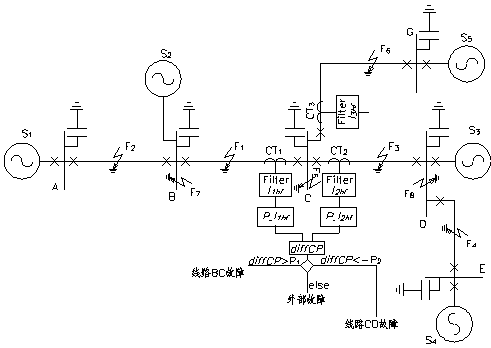Transmission line self-adaptive single-end transient protection based on transition resistance and fault angle reductions
A transition resistance and transient protection technology, applied in the direction of emergency protection circuit devices, electrical components, etc., can solve the problems of unreliable and unstable performance of single-ended transient protection, and achieve high reliability of protection action, easy setting, and improved The effect of protecting reliability
- Summary
- Abstract
- Description
- Claims
- Application Information
AI Technical Summary
Problems solved by technology
Method used
Image
Examples
Embodiment
[0017] figure 1 Shown is a 500kV EHV transmission line model. In this model, AB The section line length is 180km, BC The section line length is 342km, cd The section line length is 360km, DE The line length of this section is 266km, CG The section line length is 270km. S 1 =35MVA,S 2 =10MVA, S 3 =20MVA,S 4 =5MVA,S 5 =12MVA. Line parameters X 1 , R 1 , C 1 , X 0 , R 0 , C 0 respectively X 1 =0.2783Ω / km, R 1 =0.0270Ω / km, X 0 =0.6494Ω / km, R 0 =0.1948Ω / km, C 1 =0.0127μF / km, C 0 =0.0090μF / km. The capacitance of each busbar to ground is 6000PF. right figure 1 In the shown ultra-high voltage transmission line, the adaptive single-ended transient protection of the transmission line is calculated based on the transition resistance and the fault angle, including the following steps.
[0018] Step 1: Collect busbars C Transient current on both sides I 1 , I 2 , to extract the transient current I 1 and I 2 high frequency components I ...
PUM
 Login to View More
Login to View More Abstract
Description
Claims
Application Information
 Login to View More
Login to View More - R&D
- Intellectual Property
- Life Sciences
- Materials
- Tech Scout
- Unparalleled Data Quality
- Higher Quality Content
- 60% Fewer Hallucinations
Browse by: Latest US Patents, China's latest patents, Technical Efficacy Thesaurus, Application Domain, Technology Topic, Popular Technical Reports.
© 2025 PatSnap. All rights reserved.Legal|Privacy policy|Modern Slavery Act Transparency Statement|Sitemap|About US| Contact US: help@patsnap.com

